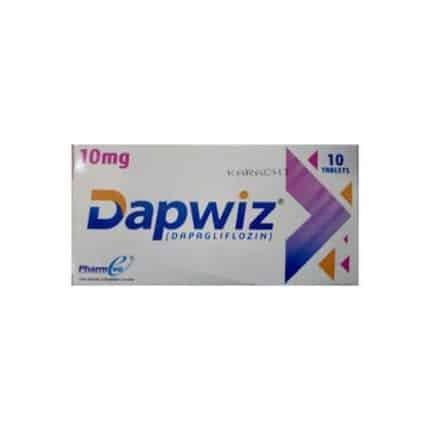Dapwiz 10mg Tablet contains the active ingredient Dapagliflozin, which belongs to a class of medications called sodium-glucose cotransporter 2 (SGLT2) inhibitors. It is primarily prescribed for the management of type 2 diabetes mellitus to help lower blood sugar levels. Dapagliflozin works by inhibiting SGLT2 in the kidneys, thereby reducing the reabsorption of glucose and promoting its excretion in the urine, leading to a decrease in blood glucose levels.
Uses:
- Type 2 Diabetes Mellitus: Dapwiz 10mg Tablet is used to improve glycemic control in adults with type 2 diabetes mellitus. It is typically prescribed as part of a comprehensive treatment regimen that includes diet, exercise, and other antidiabetic medications.
How it Works:
Dapagliflozin in Dapwiz 10mg Tablet works by inhibiting sodium-glucose cotransporter 2 (SGLT2) in the proximal tubules of the kidneys. This mechanism reduces the reabsorption of glucose from the urine into the bloodstream, thereby increasing the excretion of glucose in the urine and lowering blood glucose levels.
Dosage and Administration:
- The dosage of Dapwiz 10mg Tablet may vary depending on individual factors such as the patient’s medical condition, kidney function, and response to treatment.
- It is usually taken orally once daily, with or without food.
- The tablet should be swallowed whole with a glass of water and should not be crushed or chewed.
Side Effects:
Common side effects of Dapwiz 10mg Tablet may include:
- Genital yeast infections (in women and men)
- Urinary tract infections
- Increased urination
- Thirst
- Hypoglycemia (low blood sugar) when used in combination with insulin or other antidiabetic medications
- Increased cholesterol levels
- Dehydration
- Dizziness or lightheadedness
Serious side effects such as ketoacidosis, kidney problems, or allergic reactions are rare but require immediate medical attention if experienced.
Precautions:
- Inform the healthcare provider about any allergies, medical conditions, or medications the patient is currently taking before starting Dapwiz 10mg Tablet.
- Monitor for signs of genital yeast infections, urinary tract infections, dehydration, or kidney problems during treatment with dapagliflozin.
- Use caution in patients with a history of ketoacidosis, heart failure, or liver impairment.
When Not to Use:
Dapwiz 10mg Tablet should not be used in patients with:
- Hypersensitivity to dapagliflozin or any other components of the medication.
- Severe kidney impairment (eGFR < 30 mL/min/1.73 m²) or end-stage renal disease.
FAQs:
- Can Dapwiz 10mg Tablet be used alone or in combination with other antidiabetic medications? Dapwiz 10mg Tablet can be used alone or in combination with other antidiabetic medications, depending on the patient’s individual needs and treatment goals. It is often used as part of a comprehensive treatment regimen for type 2 diabetes mellitus.
- How long does it take for Dapwiz 10mg Tablet to start lowering blood sugar levels? Dapwiz 10mg Tablet may begin to lower blood sugar levels within a few days of starting treatment. However, it may take several weeks to achieve optimal glycemic control. Regular monitoring of blood glucose levels is essential during treatment.
- What should I do if I miss a dose of Dapwiz 10mg Tablet? If a dose is missed, it should be taken as soon as remembered, unless it is almost time for the next scheduled dose. In that case, the missed dose should be skipped, and the regular dosing schedule resumed. Doubling the dose to make up for a missed one should be avoided.
- Is Dapwiz 10mg Tablet safe to use during pregnancy or breastfeeding? The use of Dapwiz 10mg Tablet during pregnancy or breastfeeding is not recommended due to limited data on its safety in these populations. Consultation with a healthcare provider is necessary for guidance and appropriate management.
- Can Dapwiz 10mg Tablet cause dehydration? Dapwiz 10mg Tablet may increase the risk of dehydration, especially in elderly patients or those with kidney impairment. Adequate fluid intake should be maintained during treatment, and symptoms of dehydration (such as thirst, dry mouth, or dark urine) should be monitored.






Reviews
There are no reviews yet.